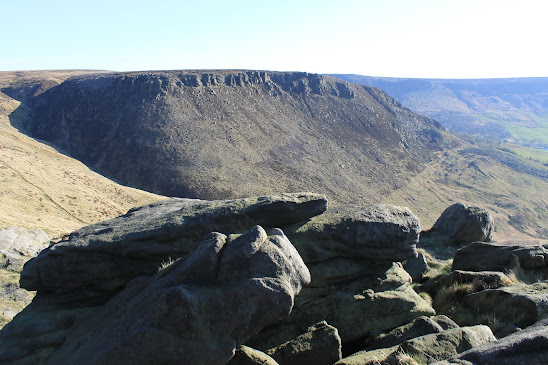Meditazioni delle Vette (translated as Meditations on the Peaks: Mountain Climbing as Metaphor for the Spiritual Quest) is a work by Italian esoteric writer Julius Evola. A collection of articles from between 1930 and 1955 as assembled by Renato del Ponte. Published in 1974 by La Spezia: Ed. del Tridente; English translation by Inner Traditions, 1998. The excerpt is from pages 22-23. Images are from a walk I did around Dovesone Reservoir in April this year. The descent was treacherous; partly through white rapid river, partly through ravine. I had to hang at full stretch in places just to get down through the slippery rocks. The words of Evola echoed through my mind. If they are the last words to go through my mind before falling to my death I thought, they are good words and worthy of an heroic end.
“In this way, beyond the natural symbol of the
mountain, which is directly perceived by the senses, we can access its
doctrinal and traditional symbolism, namely, the deeper content of all the
previously mentioned ancient myths in which the mountain appears as the seat of
divine natures, immortalizing substances, forces of solar and supernatural
regality (for example, the solar mountain referred to in the traditions of the
Hellenized Roman Empire and the mountain as the seat of Mazdean glory), as
spiritual center (Mount Meru and the other symbolic mountains conceived as
poles), and so forth. In fact, in all this we see the various depictions,
personifications, and projections of transcendent states of consciousness, or
inner awakening and enlightenment. These projects are said to be real when they
no longer represent something vague, mystical or fantastic, but rather when
they are perceived according to the evidence and normalcy of a superior order
that regards as abnormal everything that was previously regarded as familiar
and habitual.
“It is possible that the
ancients, who ignored mountain climbing or only knew some rudimentary
techniques (and therefore knew the mountain as an inaccessible and inviolable
entity), were consequently lead to experience it as a symbol and as a
transcendent spirituality. Considering that today the mountain has been
physically conquered and that there are few peaks that man has not yet reached,
it is important to keep the conquest from being debased and from losing its
higher meaning. Thus, it is necessary that the younger generation gradually
come to appreciate action at the level of ritual and that they slowly succeed
in finding again a transcendent reference point. It is through this reference
point that the feats of audacity, risk, and conquest as well as the disciplines
of the body, the senses, and the will that are practiced in the immovable,
great, and symbolic mountain peaks, lead men to the realization that all in man
is beyond himself. In this way these feats will be justified in the context of
the spiritual revolutionary movement that is currently emerging among our
people.”
North Utsire





No comments:
Post a Comment